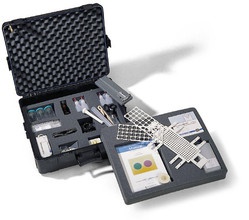
The Ministry of Health (MOH) on Wednesday received a compact mobile laboratory donated by Global Pharma Health Fund (GPHF), for the identification of counterfeit medicines.
The laboratory, was the 500th to be donated by GPHF, a charitable initiative financed by Merck Germany, a German-based global pharmaceutical and chemical company.
It costs 4,000 Euros and contains the essential lab ware and chemicals, as well as authentic tablets and capsules for reference purposes.
Supplies include sufficient quantities of solvents to perform about 1,000 assays, while ensuring that the total material costs for one test run do not exceed three Euros.
Mr. Rojo Mettle-Nunoo, Deputy Minister of Health who received the donation, thanked the donors for their gesture, saying it came in handy at a time when the Food and Drugs Board (FDB) had committed itself to the elimination of counterfeit and sub-standard medicines.
He said the facility would be handed over to the FDB to complement their operations throughout the country, adding “The FDB already has five mobile lab facilities and this would add up to make it six to make their work more efficient.”
Mr. Mettle-Nunoo said counterfeit medicines proliferation constituted serious health hazards in developing countries including Ghana.
“A survey conducted by the FDB in 2008, exposed 35 per cent of anti-malarials as counterfeits.
“However, FDB has been able to reduce this high figure to five per cent as at 2012 with the effective use of the Minilab technology, and is committed to utilise the facility to totally halt the activities of peddlers of such counterfeit and sub-standard medicines in the country,” he said.
Dr Stephen K. Opuni, Chief Executive Officer of FDB, explained that currently, a total of 21 minilabs were already being used in Ghana whilst additional ones would make available a valuable contribution to quality control of medicines.
Mr. Frank Gotthardt, Chairman of GPHF and Head of Public Affairs at Merck, explained the advantage of the minilab technology saying, “Many counterfeit medicines have no therapeutic benefit or sometimes even contain harmful substances.”
He said GPHF minilabs were globally unique for their ability to detect such counterfeits quickly, cost-effective and reliable.
Mr. Gotthardt said GPHF had so far donated minilabs to more than 80 countries or delivered them at cost and were being used in most African countries.
He explained that, currently 57 active pharmaceutical ingredients could be tested, particularly those in medicines commonly used against infectious diseases.
Mr. Gerald Asamoah, a Ghanaian-born German international footballer, who was also a member of the German national team in 43 national matches, initiated the idea of the donation as part of his contribution to Ghana.
He established the Gerald Asamoah Foundation for Children with Heart conditions in 2007, to support German and international aid projects.
The footballer has long-term plans to build a clinic in Accra for children with heart conditions.
Mr. Asamoah said he was impressed by the minilab flexibility and how quickly and easily counterfeit medicines could be detected using the analytical methods of the lab.
He expressed appreciation to Managing Director of Merck for North West Africa, Mr. Karim Benhaou Merck, who promised him an ultrasound measuring device for the Paediatric Ward of Korle-Bu Teaching Hospital in Accra, saying “Being a victim of a cardiac disease, I know the device will be a blessing for many children”.**